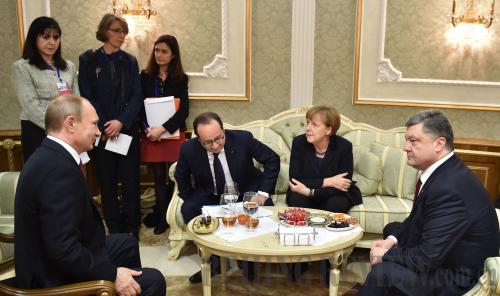 |
|
A NEW HOPE: Russian President Vladimir Putin, French President Francois Hollande, German Chancellor Angela Merkel and Ukrainian President Petro Poroshenko (left to right) attend a meeting to discuss the Ukraine crisis on February 11 in Minsk, capital of Belarus (XINHUA/AFP) |
Thanks to the mediation and shuttle diplomacy of European leaders—German Chancellor Angela Merkel and French President Francois Hollande—four-party peace talks between Germany, France, Russia and Ukraine were resumed in the Belarusian capital Minsk on February 12 and produced an anticipated yet joyless ceasefire deal after intense negotiations.
Though observers were affirmative that the new truce deal was to be honored by all parties, the temporary progress would not ensure the settlement of the crisis. Due to the complexity of the situation, the ultimate solution lies in a strategic compromise between Russia and the United States.
A year after the crisis broke out, the U.S.-led economic sanctions against Russia have failed to turn the Ukrainian situation around. Latest UN statistics showed that the civil conflict in Ukraine had claimed more than 5,300 lives, leaving thousands of families in the country's eastern parts homeless. Moreover, the U.S.-dominated strategy has not only intensified tensions between Moscow and the West, but also put serious economic and security pressure on both sides.
Conflicting interests
Ahead of the Minsk talks, Hollande and Merkel visited Kiev and Moscow and held lengthy talks with Russian President Vladimir Putin. Merkel also paid a short visit to Washington to coordinate Germany's stance with U.S. President Barack Obama.
Observers said the escalating tensions in Ukraine are now a matter of deep concern for European countries. Many Europeans are aware of Washington's underlying aim to exploit the Ukraine crisis in order to weaken Russia, and are unwilling to risk their own security to advance the U.S. agenda.
As the Ukrainian army lost ground in its battle against the pro-independence anti-government forces, Washington threatened to provide weapons to Ukraine for "self-defense." Commander of the U.S. Army in Europe Frederick Hodges also disclosed recently that the United States was planning to train the Ukrainian army starting from March this year.
Russia has since warned of the serious consequences that could follow U.S. arms shipments to Ukraine, which it said would escalate the conflict.
Feng Yujun, a senior researcher on Eastern European studies with the China Institutes of Contemporary International Relations (CICIR), said the U.S. moves are not conducive to the settlement of the current crisis, but are rather more likely to expand the war. European countries would likely become the first victims of resulting blowback.
The U.S. proposal has drawn rebukes from many European leaders. When addressing the 51st Munich Security Conference recently, German Defense Minister Ursula von der Leyen declared that providing arms to Ukraine would add fuel to the flames of the crisis. On the same occasion, defense ministers from Italy, Britain and Holland all claimed that only non-deadly military assistance should be provided to Ukraine, adding that the conflict can be solved only through diplomacy.
In an interview with France Inter Radio about whether France would send weapons to Kiev, French Foreign Minister Laurent Fabius said, "[Sending weapons] is not among our plans. We think arming is not the solution in the case of Ukraine. We believe the solution is a political one," Fabius said.
Jia Xiudong, a researcher with the China Institute of International Studies, noted that conflicting interests were behind divergences across the Atlantic. Tensions between the West and Russia have not only damaged the Russian economy, but harmed European business interests as well.
